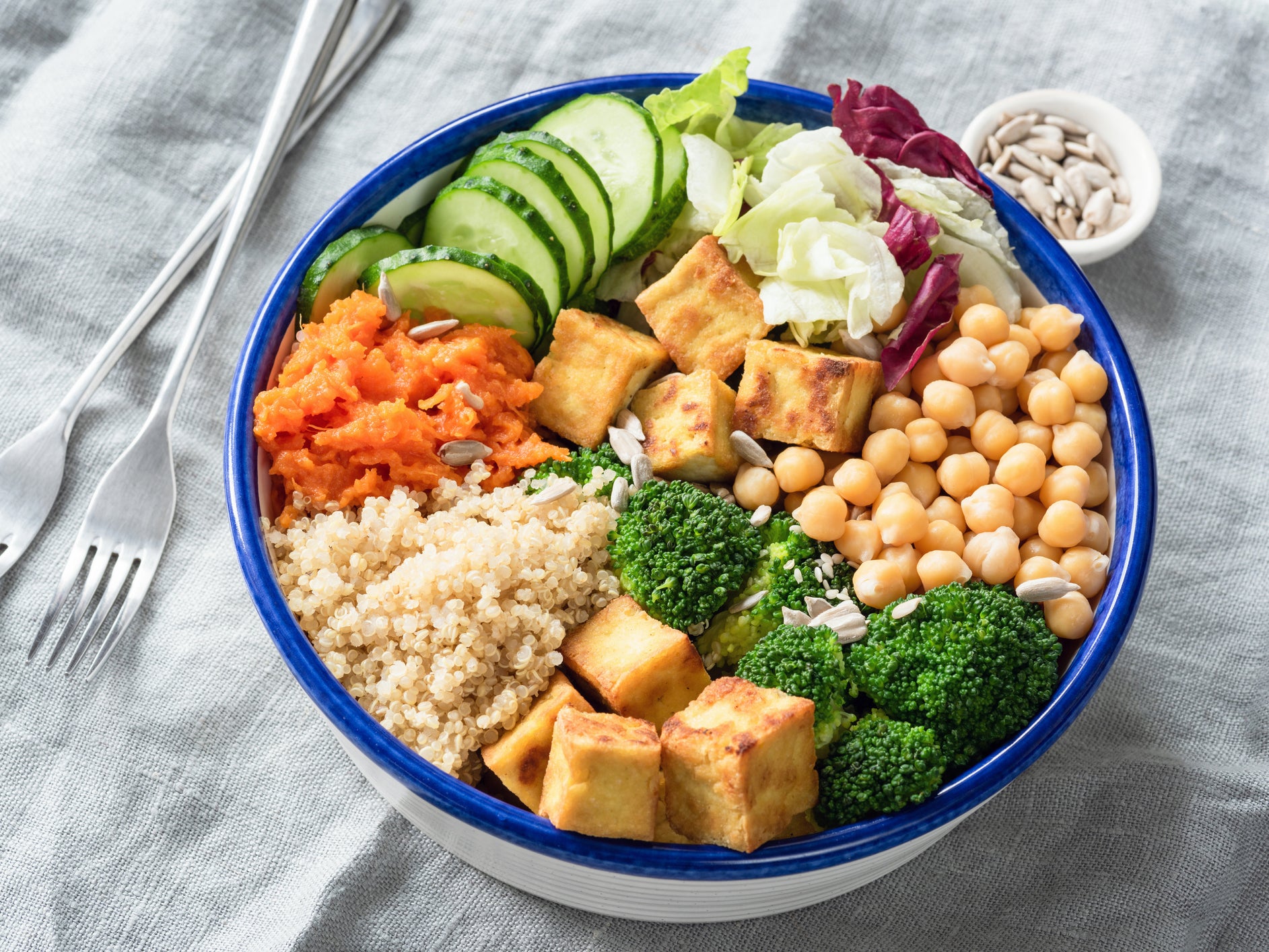Do you know that a plant-based diet can prove to be a healthier lifestyle option with fewer cases of heart disease, type 2 diabetes, and obesity? A vegetarian diet contains less of saturated fat when compared to its non-veg counterpart, with more fiber, antioxidants, and folate. As more and more people move from non-vegetarian food options to vegetarian foods and a vegan diet plan, the demand for High Protein Vegetarian foods that substitute for a Non-Veg meal is on a rise.
Shift from Meat to a high protein Vegetarian Diet plan
- It’s been observed that people shift to meat substitutes for a variety of reasons. Some do it for ethical reasons while some prefer to switch for health reasons.
- Do you know, meat consumption could lead to digestive problems like constipation or diarrhoea among some people? Studies suggest that eating red meat has the potential to increase the risk of a specific gastrointestinal condition, diverticulitis.
- Switching to a vegetarian or a vegan diet plan is environmentally healthy too. Do you know, eating less meat could be environmentally healthy and boost your overall health? Before you wish to adopt the vegetarian diet or a vegan diet plan, be informed which vegetarian foods provide the essential nutrients that you require.
There are different types of vegetarian diets :
- Lacto-vegetarian diet- This diet excludes all the foods which contain fish, meat, eggs, and poultry. The Lacto-vegetarian diet includes dairy products, like milk, cheese, yogurt, and butter.
- Ovo-vegetarian diet– This diet excludes dairy products and animal proteins except for eggs.
- Lacto-Ovo vegetarian diet– In a Lacto-Ovo vegetarian diet, you can eat dairy products and eggs. You cannot consume fish, poultry, and meat.
- Vegan diet- This diet excludes all animal sub-products like poultry, fish, eggs, meat and dairy products.
How to switch to a Vegetarian diet plan
Changing dietary habits is never easy. To begin with, you could start by preparing meat-free dishes each week, and gradually switch to substitutions like tofu instead of chicken or opt for grilled vegetables instead of meat. If you aim to adapt to a vegetarian diet for weight loss or a vegan diet for weight loss, food substitutes like legumes, pulses, and green leafy vegetables are an excellent option.
Planning a vegetarian diet is exciting as there are many options to adapt to a healthy vegetarian diet. The most important rule remains to include a wide variety of legumes, whole grains, vegetables and fruits in different meals during the day. Besides, you can include nuts, cereals, potatoes, peanut butter and less familiar foods like soy milk to your diet.
“Adapting to a vegetarian diet plan or vegan diet plan will not only give you the nutritional gains but will also enhance your taste buds”
Adapting to high-protein Vegetarian Foods
There are different approaches to adopt while some people may opt to instantly trade their usual diet for a vegetarian plan while others may prefer a slower approach that includes adoption to vegetarian meals gradually. This adoption allows a comfortable transition giving ample time to respond to the nutrient needs. The goal is to make nutritionally sound changes that are comfortable to adapt.
Do you know that some foods mimic meat and dairy products in the diet? These food groups are made from wheat protein, vegetable sources, and soybeans helpful to those who are substituting meat to a vegetarian diet. For those who are on a vegan diet plan, and search for alternatives to supplement their dairy foods, consider soymilk, soy yoghurt, and soy cheese as substitutes.
Trading with a Vegan diet plan and Vegetarian Protein diet
Substituting dairy foods
Do you know it is easy to obtain your dietary requirements of calcium without including dairy foods? If you aim to eliminate dairy from your diet, start by identifying foods that provide adequate calcium to substitute for your requirements and start including them in your meals. Some good choices are calcium-fortified soymilk, calcium-fortified cereals to name a few. Calcium is found in a wide variety of plant foods like calcium-fortified orange juice, leafy green vegetables and broccoli.
Substituting Eggs
Eggs are a storehouse for protein, but do you know that there are supplements that give you more protein than eggs? Try Quinoa, a gluten-free grain, which brings you tons of amino acids which are extremely important for a healthy lifestyle. A vegan diet foods favourite, 1 cup of Quinoa contains almost 8 grams of protein. Soya Bean is known for its versatility as a food source, 1 cup of Soya can provide you with roughly 28 grams of protein.
Substituting Meats
Following a vegetarian diet plan? Try Tofu which makes an excellent substitute for chicken as it is a good source of high-quality, complete protein. Try Beans and legumes an excellent in-expensive alternative considered to be healthy and filling. Beans and Legumes come with a variety of options that you will be spoilt for choice. These include kidney beans, chickpeas, black beans, split peas, black-eyed peas, and peanuts to name a few. Besides, Lentils have always been an excellent choice for those who want to opt for high protein vegan foods or high protein vegetarian foods.
Switching to a Healthy Vegan / Vegetarian food
If you have decided to opt for the vegetarian/ vegan diet plan, the question is how do you start? Transitioning to a vegetarian/ vegan lifestyle can seem daunting and may seem to be a lot scarier than doing it. Before you begin the transition, dietitians always advice to begin by starting to familiarize yourself with vegan protein foods. This will be very helpful, to make you feel prepared and informed as you begin changing your lifestyle.
Here are some ideas and guidelines that may help you to adapt to the change-
- Take care not to increase your consumption of eggs, meat, poultry and fish, focus on including more plant-based protein sources instead.
- If you haven’t already, incorporate more whole grains, beans, legumes, tofu, nuts, and seeds to your diet while simultaneously cutting down on the animal products that you’ll miss the least.
Once you begin to feel comfortable with your vegan diet foods and lifestyle, limit the dependence on daily foods and any animal-based food as your main source of vitamins, minerals, and protein for the long-term.
Reaching out to a Dietitian
While a change is tough, specialist advice may always prove to be handy. Reaching out to a dietitian will ensure that your transition is smooth, and you get all the dietary requirements from vegetables, and dairy products (if you are a non-vegan). You can consult the best dietitians around you, by booking an appointment on the Gigadocs app.
Gigadocs is an intelligent practice management software that helps you book doctors around you and helps you to track your vitals allowing you to share them with your specialist medical practitioner on a real-time basis.
Gigadocs empowers you to-
Seek an appointment with specialist doctors at a time coinvent to you.
Maintain your health and manage the healthcare of your family though digital recordkeeping.
The Gigadocs app will notify when your medical appointments are due, thus with Gigadocs, be assured that you will never miss any follow-up appointments.
Gigadocs helps you book custom doctor appointments, track appointments, managing your entire family’s health medical records with vitals in one go!
Download Gigadocs app-
IOS App – apple.co/2W2iG4V
Andriod App – bit.ly/33AQoRC
To know more e-mail, at info@gigadocs.com.
Gigadocs wishes you healthy wellbeing!




